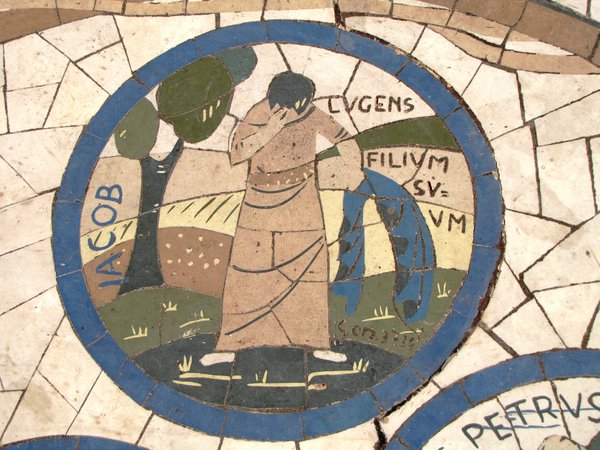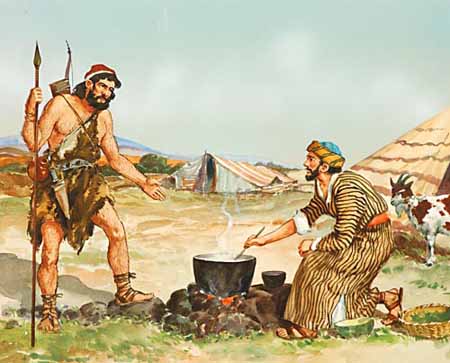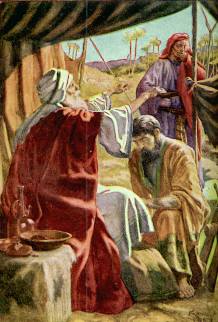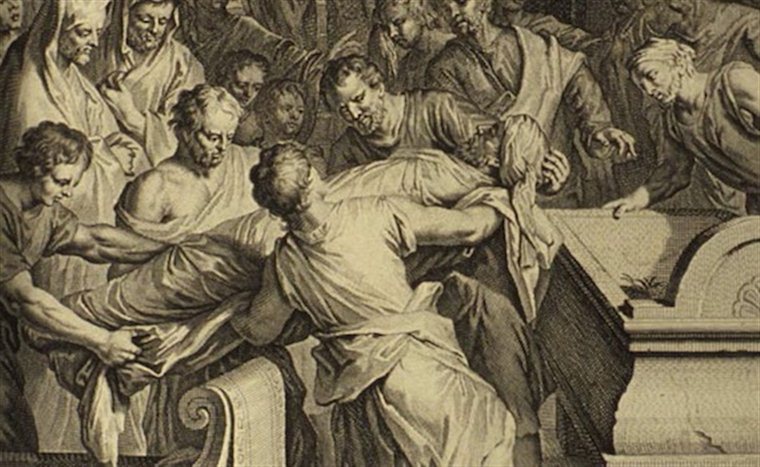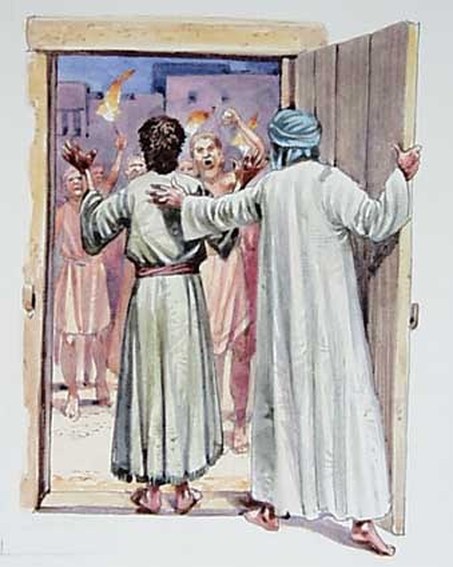[Twenty-four years have transpired since Abram left Charan; he has since —-
- journeyed to Egypt because of famine,
- split with nephew Lot and settled in the land promised to him,
- engaged in battle, rescued his nephew who seems to get in trouble a few times and is lucky to have a caring uncle like Abram,
- visited and tithed to priest-king Melchizedek,
- had a firstborn son not with wife Saray but with Egyptian servant Hagar.
The narrative picks up when he’s 99 years old.
Those who are in their senior years jokingly called the “pre-departure area,” think they have nothing left in their lives to do? Think again! YHWH our Elohim is never done with us until we have finished the work He has prepared us during the growth stages of our earthly life. Just look back and see in hindsight the hand of YHWH guiding and directing, even if we made our own choices each step of the way; right or wrong, both work to mature us but only if we’re mindful and learn particularly from our mistakes. Our Jewish teacher in Torah — “Paul” —says, when we have done our assignment for Him, then He gives us our much deserved rest. But is work for YHWH ever done? Some of us regret having “wasted” decades on learning about the wrong god and studying the wrong scriptures, but as we have gradually realized, all of that was still preparatory for where we have arrived today in our service of YHWH, the God we have embraced and now declare. If Abraham had a Chapter 2 at age 99, so can we at any age.
As our title suggests, Abraham finally gets a name-change. Are all biblical figures renamed by YHWH Himself? Evidently not, noticeably only those with a specific change in character, or divinely-assigned destiny. Of Israel’s patriarchs, only Abram and Yaakov assume new names; evidently Yitzchak or Isaac was consistently the same ‘let-it-happen-to-me’ kind of guy, unlike Abram and Yaakov who yielded or struggled with divine instructions, or consequences of their own unwise choices. David was the same God-loving character from his boyhood to old age, though he had some major lapses in life despite which, YHWH still referred to him as a ‘man after my own heart.’
Unbracketed commentary is from Pentateuch and Haftorahs, ed. Dr. J.H. Hertz; “EF” commentary is from our translation of choice, Everett Fox’s The Five Books of Moses, alternating with Robert Alter’s The Five Books of Moses, with commentary indicated by “RA.” Our own commentary is indicated b “S6K”.—Admin1.]
Genesis/Bereshith 17
1 Now when Avram was ninety years and nine years old[EF] Ninety years and nine years: Thirteen years have elapsed since the events of the previous chapter. Now that Yishmael is entering puberty, God can no longer conceal that he is not the promised heir. See vv.16,18. Shaddai: Hebre
YHVH was seen by Avram and said to him: I am God Shaddai.I am God Almighty. Heb. El Shaddai; Exod. VI,3 “and I appeared unto Abraham, unto Isaac, and unto Jacob, as God Almighty.’ The derivation of the Divine Name, Shaddai, is uncertain. The usual translation, ‘Almighty,’ is due to the Vulgate (the Latin version of the bible). The realization of Abram’s hopes must often have appeared dim and distant to him. Here he is reassured: nothing is impossible to God Almighty. Shaddai has also been derived from a root meaning ‘to heap benefits’; and it would then mean ‘Dispenser of benefits’, the Friend who shepherds the Patriarchs and preserves them from all harm.
[EF] Shaddai: Heb. obscure. Traditionally translated “Almighty”; others use “of the mountains.” In Genesis the name is most often tied to promises of human fertility, as in v. 2.
[RA] El Shaddai. The first term, as in El Elyon (Chapter 14), means God. Scholarship has been unable to determine the origins of precise meaning of the second term—tenuous associations have been proposed with a Semitic word meaning “mountain” and with fertility. What is clear 9compare Exodus 6:3) is that the biblical writers considered it an archaic name for God.
1 Walk in my presence! And be wholehearted!wholehearted. i.e. place implicit and undivided confidence in God alone. The Rabbis connect this exhortation with the Covenant of Circumcision, which was about to be instituted, and thus indicate the moral ideal which underlies the ritual act.
[EF] Walk . . . be wholehearted: Contrasted to Noah (6:9), Avram is a genuine religious man who lives his faith actively.
[RA] Walk in my presence. Or ‘before me,” In verse 18, the same preposition manifestly has the idiomatic sense of “in Your favor.” The verb is the same used for Enoch’s walking with God, but there the Hebrew preposition is actually “with.” The meaning of this idiom is “to be devoted to the service of.”
2 I set my covenant between me and you, I will make you exceedingly, exceedingly many.
make my covenant. lit. ‘I will give (i.e. grant) My covenant.’ What follows is not a compact between God and the Patriarch, but a statement of the plans which He had designed for Abram and his descendants.
[RA] My covenant. The articulation of the covenant in this chapter is organized in three distinct units—first the promise of progeny and land, then the commandment of circumcision as sign of the covenant, then the promise of Sarah’s maternity. The politics of the promise is now brought to the foreground as for the first time it is stipulated that both Abraham and Sarah will be progenitors of kings. Source critics have observed that this second covenantal episode, attributed to Priestly circles, abandons the sense of an almost equal pact between two parties of chapter 15 and gives us an Abraham who is merely a silent listener, flinging himself to the ground in fear and trembling as God makes His rather lengthy pronouncements. But Abraham’s emphatic skepticism in verses 17-18 suggests that there is more complexity in his characterization here than such readings allow.
3 Avram fell upon his face. God spoke with him, saying:
And Abram fell on his face. The Oriental mode of expressing gratitude.
4 As for me, here, my covenant is with you, so that you will become the father of a throng of nations.
a multitude of nations. The Israelites; the Arabs, descended from Ishmael; and the tribes enumerated in XXV:1.
[EF] throng: The word suggests the sound of a crowd, rather than merely a large number.

Image from www.khandipages.com
5 No longer shall your name be called Avram, rather shall your name be Avraham, for I will
make you Av Hamon Goyyim/Father of a Throng of Nations!
Abraham . . . multitude of nations. Ab means ‘father’; and raham, the second half of the new name, is an Arabic word for ‘multitude’. The change of name emphasizes the mission of Abraham, which is “To bring all the peoples under the wings of the Shechinah’.
[EF] Avraham: Trad. English “Abraham.”
[RA] Abram . . . Abraham. The meaning of both versions of the name is something like “exalted father.” The longer form is evidently no more than a dialectical variant of the shorter one. The real point is that Abraham should undergo a name change—like a king assuming the throne, it has been proposed—as he undertakes the full burden of the covenant. Similarly in verse 15, the only difference between Sarai and Sarah is that the former reflects an archaic feminine suffix, the latter, the normative feminine suffix: both versions of the name mean “princess.”
[S6K] Abram goes through a name-change together with wife Sarai. Not every biblical figure undergoes such a change; 2nd generation Isaac does not, 3rd generation Jacob does; Moses, Joshua, Saul and David don’t. If names indicate the essence of a person, renaming makes sense specially when the new name suggests destiny.
6 I will cause you to bear fruit exceedingly, exceedingly, I will make nations of you, (yes,) kings will go out from you! 7 I establish my covenant between me and you and your seed after you, throughout their
generations as a covenant for the ages, to be God to you and to your seed after you. 8 I will give to you and to your seed after you, the land of your sojournings, all the land of Canaan, as a holding for the ages, and I will be God to them. the land of thy sojournings. The land in which Abraham dwelt only as ‘a sojourner.’
[EF] I will be God to them: Often reiterated as part of the biblical covenant (e.g. 28:21).
9 God said to Avraham: As for you, you are to keep my covenant, you and your seed after you,
throughout their generations. 10 This is my covenant which you are to keep, between me and you and your seed after you: every male among you shall be circumcised.this is My covenant which ye shall keep. The meaning is not that the Covenant is to consist in the rite of circumcision, but that circumcision is to be the external sign of the covenant. As the following verse declares, ‘it shall be a token of a covenant,’ just as the rainbow was the token of the covenant with Noah. And even as the rainbow had existed before noah, this rite had been practised among other peoples before Israel. To whatever origin and purpose it might be traced—whether as a measure safeguarding cleanliness and health (Philoo), or to counteract excessive ust Maimonides), or as a sacrificial symbol—for Abraham and his descendants all these conceptions are supplanted, and the rite is the abiding symbol of the consecration of the Children of Abraham to the God of Abraham. It is the rite of the covenant; and unbounded ahs been the loyalty and devotion with which this vital and fundamental institution of the Jewish Faith has been and is being observed. Jewish men and women have in all ages been ready to lay down their lives in its defence. The Maccabean martyrs died for it. The officers of King Antiochus put to death the mothers who initiated their children into the Covenant—‘and they hanged their babes about their necks’ (I Maccabees I, 61). the same readiness for self-immolation in defense of this sacred rite we find in the times of the Hadrianic persecution, in the dread days of the Inquisition, yea, whenever and wherever tyrants undertook to uproot the Jewish Faith. Even an excommunicated semi-apostate like Benedict Spinoza declares: ‘Such great importance do I attach to the sign of the Covenant, that I am persuaded that it is sufficient by itself to maintain the separate existence of the nation for ever.’
[RA] every male among you must be circumcised. Circumcision was practiced among several of the West Semitic peoples and at least in the priestly class in Egypt, as a bas-relief at Karnach makes clear in surgical detail. To Abraham the immigrant from Mesopotamia, E.A. Speiser notes, it would have been a new procedure to adopt, as this episode indicates. The stipulation of circumcision on the eighth day after birth dissociates it from its common function elsewhere as a puberty rite, and the notion of its use as an apotropaic measure (compare Exodus 4) is not intimated here. A covenant sealed on the organ of generation may connect circumcision with fertility—and the threat against fertility—which is repeatedly stressed in the immediately preceding and following passages. The contractual cutting up of animals in Chapter 15 is now followed by a cutting of human flesh.
11 You shall circumcise the flesh of your foreskin, so that it may serve as a sign of the covenant between me and you.[S6K] The covenant sign for Noah is nothing compared to the covenant sign required of Abraham and his descendants: circumcision. All Noah had to do was to think of the covenant every time he saw a rainbow; Abraham at age 99, Ishmael at age 13 years, and Isaac at 8 days old all had to show their sign of submission to YHWH through this sign in their flesh. Why Abraham would know what is required for circumcision could mean it has been in practice among other people groups but obviously not Abraham’s progenitors. What is significant is that it is required for Abraham’s bloodline as well as for foreigners in his household.
12 At eight days old, every male among you shall be circumcised, throughout your generations, whether house-born or bought with money from any foreigner, who is not your seed.he that is born in the house. i.e. the child of a slave; see on XIV,14. Slaves were regarded as part of the household.
[EF] house-born or bought with money: i.e. slaves. The entire household, as an extension of the man’s personality, is to be brought into the covenant.
13 Circumcised, yes, circumcised shall be your house-born and your money-bought (slaves), so that my covenant may be in your flesh as a covenant for the ages.silver. If the language of the text reflects the realia of the Patriarchal period, the term would refer to silver weights. If it reflects the writer’s period, it would refer to money, since by then coins had been introduced. The weighing-out of silver by Abraham in chapter 23 argues for the likelihood of the former possibility.
14 But a foreskinned male, who does not have the foreskin of his flesh circumcised, that person shall be cut off from his kinspeople- he has violated my covenant! cut off from his people. Either through punishment at the hands of God; or through expulsion from the community.
15 God said to Avraham: As for Sarai your wife-you shall not call her name Sarai, for Sara/Princess is her name! Sarah. Brings out more forcibly the meaning ‘Princess’ than the archaic form Sarai.
[EF] you shall not call her name Sarai: Significantly Sara is the only woman in the bible to have her name changed by God.
16 I will bless her, and I will give you a son from her, I will bless her so that she becomes nations, kings of peoples shall come from her! [EF] so that she becomes nations: Sara in essence shares the blessing of God. She is not merely the biological means for its fulfillment.
17 But Avraham fell on his face and laughed, he said in his heart: To a hundred-year-old man shall there be (children) born ? Or shall ninety-year-old Sara give birth?and laughed. The Targum renders ‘and rejoiced’, to imply that he laughed for joy, not from incredulity. What follows would accordingly not be a question, but an exclamation of surprise.
[EF] laughed: Laughter becomes the key word of most of the stories about Yitzchak.
[RA] and he laughed. The verb yitsaq is identical with the Hebrew form of the name Isaac that will be introduced in verse 19. The laughter here—hardly the expected response of a man flinging himself on his face—is in disbelief, perhaps edged with bitterness. In the subsequent chapters, the narrative will ring the changes on this Hebrew verb, the meaning sof which include joyous laughter, bitter laughter, mockery, and sexual dalliance.
to a hundred year old. Abraham’s interior monologue is represented as a line of verse that neatly illustrates the pattern of heightening or intensification from first to second verset characteristic of biblical poetry: here, unusually (but in accord with the narrative data), the numbers go down from first to second verset, but the point is that, as incredible as it would be for a hundred-year-old to father a child, it would be even more incredible for a ninety-year-old woman, decades past menopause, to become a mother. The Abraham who has been overpowered by two successive epiphanies in this chapter is now seen as someone living within a human horizon of expectations. In the very moment of prostration, he laughs, wondering whether god is not playing a cruel joke on him in these repeated promises of fertility as time passes and he and his wife approach fabulous old age. He would be content, he goes on to say, to have Ishmael carry on his line with God’s blessing.
18 Avraham said to God: If only Yishmael might live in your presence!Ishmael might live. Abraham, despairing of the possibility of having issue by Sarah, expresses the hope that Ishmael ‘might live before Thee’, in order that the promises made to Abraham might be fulfilled through him. It is also possible to understand it as a prayer that, though Ishmael is excluded from the spiritual heritage, he may yet live under the Divine care and blessing.

Image from 70facets.org
[EF] Yitzchak: Trad. English “Isaac.”
20 And as for Yishmael, I hearken to you: Here, I will make him blessed, I will make him bear fruit, I will make him many, exceedingly, exceedingly— he will beget twelve (tribal) leaders, and I will make a great nation of him. twelve princes. They are enumerated inXXV,13-16.
[EF] make him blessed . . . make him bear fruit . . . make him many: Heb. berakhti oto ve-hifreiti oto vehirbeiti oto. twelve princes: Thus equalling the twelve sons/tribes of Israel.
[RA] As for Ishmael, I have heard you. Once again, the etymology of the name is highlighted. These seven English words reflect just two Hebrew words in immediate sequence, uleyishma’el shema’tikha, with the root sh-m’ evident in both.
21 But my covenant I will establish with Yitzhak, whom Sara will bear to you at this set-time,
another year hence.
[EF] another year: Not nine months (Sara does not immediately become pregnant. Again the events seem to take place in a realistic framework, rather than in a strictly supernatural one.
22 When he had finished speaking with Avraham, God went up, from beside Avraham. [EF] God went up from beside Abraham: Perhaps a formula used to signify the end of the conversation.
23 Avraham took Yishmael his son and all those born in his house and all those bought with his
money, all the males among Avraham’s household people, and circumcised the flesh of their foreskins on that same day, as God had spoken to him.[EF] on that same day: Underlining Avraham’s customary obedience. as God had spoken to him: Like Noah in 6:22,7:5, and 7:9, Avraham’s scrupulously follows God’s commands without question (so too in 21:4 and 22:3.
24 Avraham was ninety-nine years old when he had the flesh of his foreskin circumcised, 25 and Yishmael his son was thirteen years old when he had the flesh of his foreskin circumcised. 26 On that same day were circumcised Avraham and Yishmael his son,
27 and all his household people, whether house-born or money-bought from a foreigner, were
circumcised with him.





